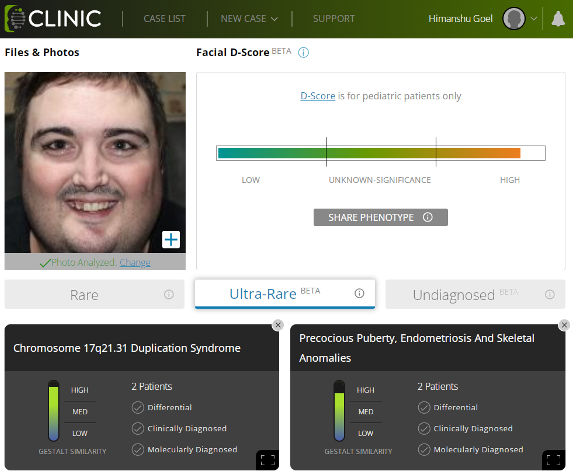
Dr. Himanshu Goel utilized FDNA’s Artificial intelligence that instantaneously matches rare disease patients’ photos with other patients’ photos around the world to allow even the rarest of genetic diseases to be identified.
Dr. Himanshu Goel, a clinical geneticist in Newcastle, Australia, used the help of Face2Gene photo-based GestaltMatcher technology to diagnose a 26-year-old patient with the Chromosome 17q21.31 Duplication Syndrome – the first ultra-rare syndrome case diagnosed with FDNA’s proprietary AI Technology.
Like most ultra-rare conditions, Chromosome 17q21.31 Duplication Syndrome requires a lengthy genotype/phenotype correlation analysis before it can be diagnosed. FDNA’s innovative photo-based AI was able to support Dr. Goel in making the diagnosis in quick time, although very few photos of diagnosed reference patients are available.
“My patient has development delay and autism and he lived most of his life in foster care. While living in an apartment in the care of the state, he met his now wife and they are thinking about starting a family”, says Dr. Goel. “He came to me in search of a diagnosis for his condition to understand the chances of his child having the same condition as he had”.
As part of this investigation, a chromosome array as well as other biochemical studies and metabolic screening were ordered. The tests found out that he had a duplication in chromosome 17q21.31. “I put his photo on Face2Gene – and when I clicked on the ULTRA-RARE tab, I was very surprised to learn it matched a recognized syndrome that is actually named Chromosome 17q21.31 Duplication Syndrome – and it matched with 2 patients on its database”.
Dr. Goel continues that seeing the patient’s photo matched in Face2Gene gave him more confidence that it was recognizable syndrome. “My patient now knows what the chances of that his child to inherit his condition and that boys and girls are equally affected”.
GestaltMatcher is a deep learning technology that matches rare disease patients’ photos with other patients’ photos around the world instantaneously, thus, potentially helping to accelerate the clinical diagnosis by medical professionals of patients with ultra-rare disorders as well as enable the definition of new syndromes. The proprietary technology strengthens next-generation phenotyping (NGP) — the capture, structuring, and analysis of complex human physiological data — by allowing medical professionals to identify hundreds of additional disorders just with facial analysis.
Face2Gene already uses its DeepGestalt technology – an algorithm that processes an input image into facial regions. Each region is fed into a Deep Convolutional Neural Network to obtain a softmax vector indicating its correspondence to each syndrome in the model.
Dr. Karen Gripp, CMO at FDNA, explains that this is a very powerful tool, however it has its limitations: “for every rare syndrome to be of use, the system must be trained for this syndrome. For this training, several diagnosed patients’ photos must be available – something that is often not possible when we are dealing with ultra-rare syndromes”.
To mitigate this limitation, Face2Gene developed the GestaltMatcher technology: patient photos are matched to a molecular diagnosis even when the disorder was not part of the training set. The output is displayed in two parallel lists, the first one ranks with the matched patients, and the second one ranks with the syndromes of these matched patients. This technology is now available on Face2Gene CLINIC’s ULTRA-RARE tab and can help doctors to achieve a diagnosis even when there are only a handful of diagnosed patients’ data on the system.
“Having a diagnosis is very important – my patient can now connect with other patients around the world and see how they are managing; we can learn more about the causes of his symptoms and start a proper treatment. He and his wife can analyze all possible scenarios and if, as a couple, they decide it is not a big problem for them to manage, they can have a child, and if he or she has the same duplication an early intervention can be targeted” explain Dr. Himanshu Goel.
Check out more information about GestaltMatcher:
